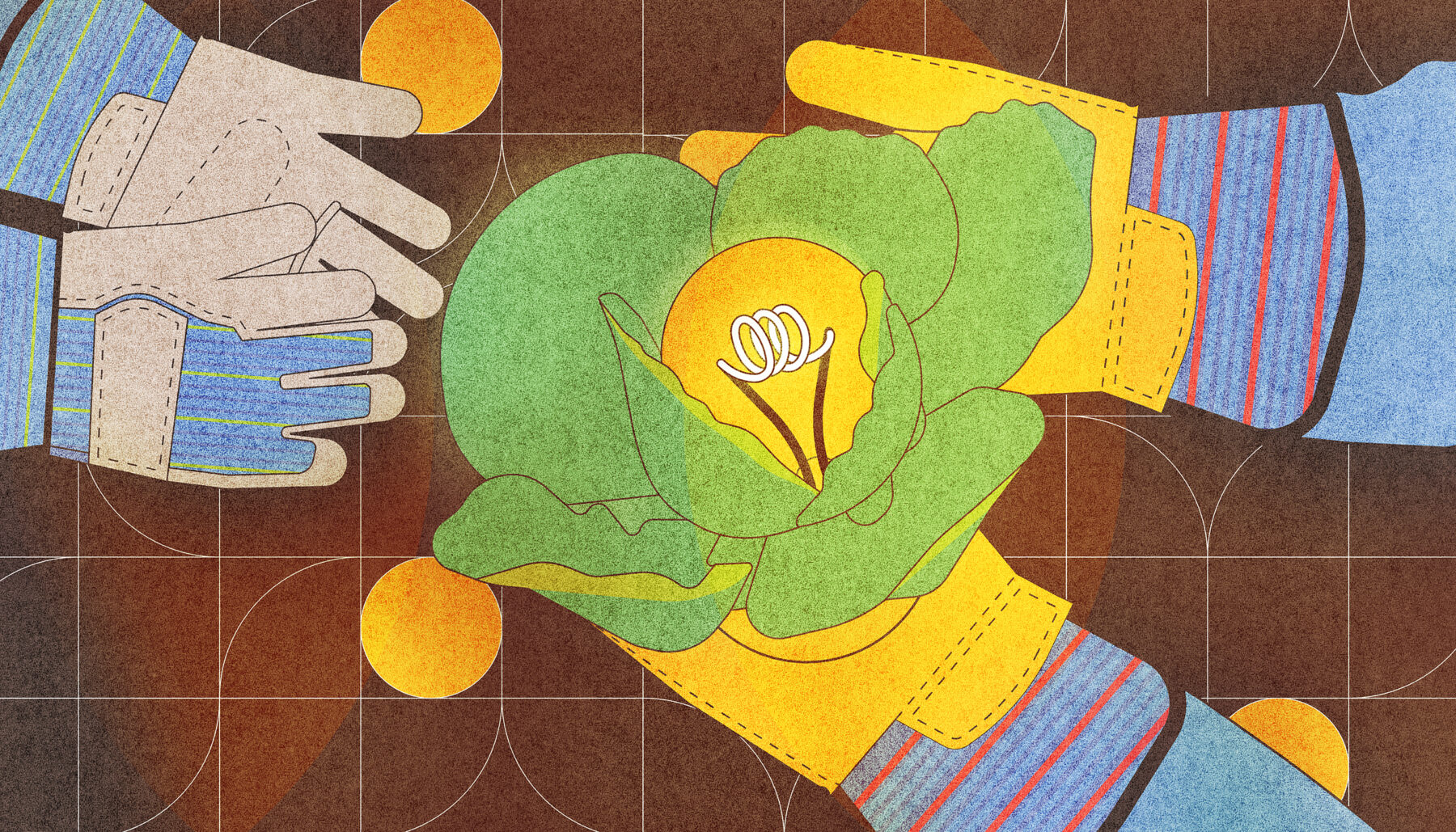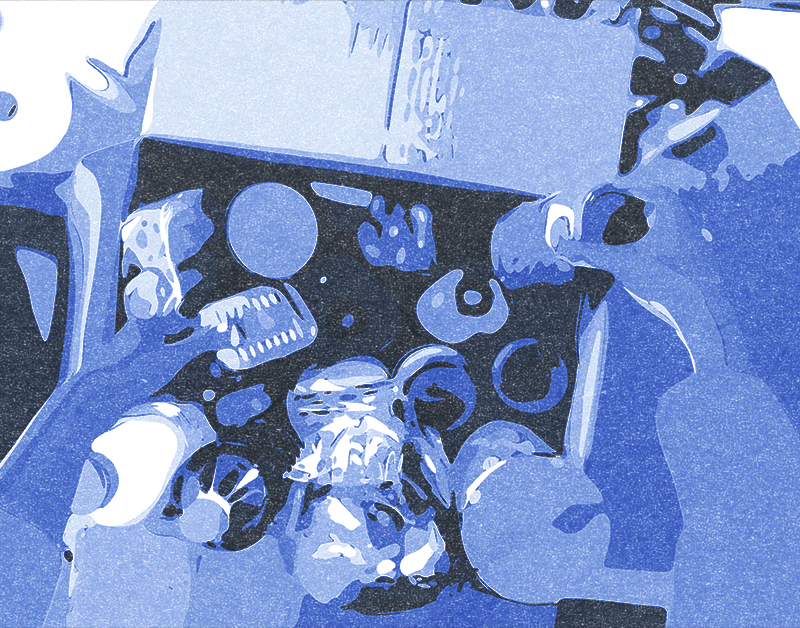
In 2021 and 2022, Aetna and Episcopal Health Foundation (EHF) collaborated to learn more about food security, centering on the everyday challenges people face while trying to meet their food needs. Departing from conventional methods, this partnership embraced a solution-oriented perspective. This Digging Deeper post is part of a blog series exploring this journey from different viewpoints.
With origins in community agriculture and food access, Sustainable Food Center (SFC) has quite literally been rooted in community from its beginnings.
Our vision is a just and equitable food system where everyone can conveniently access fresh, nutritious, culturally significant foods that are raised with care for people and the environment. In service of this vision, we are on a mission to transform our food system. To bring about lasting transformation, we recognize the need for sweeping and courageous changes in the interconnected systems and policies that form our food system.
At the heart of SFC’s work is the belief that communities hold invaluable knowledge. In November 2022, we welcomed a new approach, the PD approach, to gain insight into behaviors, mindsets, and strategies to build household and community-level food security. This initiative allowed us to engage deeply with our core community members who have lived experience with food insecurity and have, in some sense, overcome it.
Through this process, we found a tool to let go of preconceived notions about our community’s values and the nature of our work.
Our goal was not only to gain knowledge on the impact of health drivers but also to ensure that community members remain central to our work. Through this process, we found a tool to let go of preconceived notions about our community’s values and the nature of our work. It required us to align with our core values – integrity, courage, equity, community – embrace vulnerability, and shed assumptions.
Charles, Elena, and Laura welcomed us into their homes, shared a meal with us, and discussed their behaviors, beliefs, and practices related to accessing nutritious food. These sessions, which we refer to as “deep dives,” involved recorded interviews, transcriptions, and post-session debriefs to discuss what we had learned and identify valuable themes. Our resulting report provides a raw and holistic account of each participant’s experience, their perceptions of healthy food and food security, and the values they hold when selecting food to feed their families.
Key highlights include:
All participants expressed a high awareness of the impact of nutritious food on diet-related diseases and overall community health.
Charles spoke extensively about how fresh, nutritious food helped him heal from a health condition. Elena primarily turned to a diet enriched with vegetables when managing her illness. Laura hoped her community would prioritize proactive health measures before falling ill. Their interactions with the healthcare system, albeit at times incomplete or challenging, served as a powerful motivation for making dietary improvements.
All participants recounted personal experiences of struggling with food access and seeking nutrition information.
All participants advocated for themselves and others to improve their access to fresh, nutritious food.
SFC’s journey with PD deepened our understanding of the pivotal role communities play in reshaping our food system. Charles’, Elena’s, and Laura’s experiences shed light on the transformative power of fresh, nutritious food when upheld through values of community and equity.
Our community emphasized that building food security by increasing access to nutritious and culturally relevant food requires an intersectional approach. Food access is intertwined with immigration policy, childcare, transportation, education, and healthcare.
The impact of this approach extends beyond knowledge acquisition; it ignites our internal drive to critically examine how we can advance our mission to transform the food system and enact meaningful change. Our community emphasized that building food security by increasing access to nutritious and culturally relevant food requires an intersectional approach. Food access is intertwined with immigration policy, childcare, transportation, education, and healthcare.
At SFC, we believe that access to nutritious food is a basic human right and a crucial determinant of overall health and well-being. Low-income communities with experienced marginalization should have the power to determine their own food system and how they interact within it. As SFC expands our programs statewide and engages in policy, we will forge genuine partnerships with community. This involves building mutual trust, rooting our work in community knowledge, and working with decision-makers, business owners, and stakeholders throughout the food system to advance community-driven solutions.
In unity with our community, SFC is positioned to achieve our vision of a just and equitable food system through courageous and transformative action in interconnected systems.
Simone Benz is the Policy & Advocacy Director for the Sustainable Food Center (SFC), an Austin-based organization that envisions a just, equitable, and regenerative food system where people and the environment thrive. Simone and her SFC colleagues were focused students of the Positive Deviance approach. They took a team approach to applying it to their work—pulling in staff from community engagement, policy, food access and evaluation. Their resulting report provides a comprehensive look at the practical and emotional choices and navigation points that people experience in meeting basic food needs.
More from Digging Deeper

Takeaways from a Survey of Texas Food Organizations
EHF partnered with the Baylor Collaborative on Hunger and Poverty to map the landscape of Texas-based food organizations and identify potential partnership opportunities. The findings from these surveys and interviews offer valuable insights into strengthening partnerships between healthcare systems and community-based food organizations.

The Role of SNAP in Addressing Food Insecurity in Texas
Learning about the Supplemental Nutrition Assistance Program (SNAP) in Texas, formerly called ‘food stamps’, and its possible role in reducing obstacles to health and well-being is essential for our efforts to address food insecurity.

Texas’ Medicaid Managed Care Learning Collaborative: Origin, Contexts, and Key Takeaways from 2024 Efforts
Episcopal Health Foundation (EHF) launched a partnership with key stakeholders more than six years ago to harness the capacity of MCOs in addressing non-medical needs of Medicaid members. The Learning Collaborative’s work has contributed to key legislation and policy changes that advance the NMDOH work of Medicaid MCOs to continually